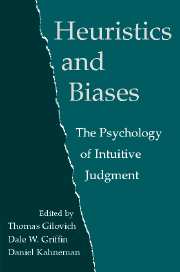Book contents
- Frontmatter
- Contents
- List of Contributors
- Preface
- Introduction – Heuristics and Biases: Then and Now
- PART ONE THEORETICAL AND EMPIRICAL EXTENSIONS
- PART TWO NEW THEORETICAL DIRECTIONS
- 22 Two Systems of Reasoning
- 23 The Affect Heuristic
- 24 Individual Differences in Reasoning: Implications for the Rationality Debate?
- 25 Support Theory: A Nonextensional Representation of Subjective Probability
- 26 Unpacking, Repacking, and Anchoring: Advances in Support Theory
- 27 Remarks on Support Theory: Recent Advances and Future Directions
- 28 The Use of Statistical Heuristics in Everyday Inductive Reasoning
- 29 Feelings as Information: Moods Influence Judgments and Processing Strategies
- 30 Automated Choice Heuristics
- 31 How Good Are Fast and Frugal Heuristics?
- 32 Intuitive Politicians, Theologians, and Prosecutors: Exploring the Empirical Implications of Deviant Functionalist Metaphors
- PART THREE REAL-WORLD APPLICATIONS
- References
- Index
29 - Feelings as Information: Moods Influence Judgments and Processing Strategies
from PART TWO - NEW THEORETICAL DIRECTIONS
Published online by Cambridge University Press: 05 June 2012
- Frontmatter
- Contents
- List of Contributors
- Preface
- Introduction – Heuristics and Biases: Then and Now
- PART ONE THEORETICAL AND EMPIRICAL EXTENSIONS
- PART TWO NEW THEORETICAL DIRECTIONS
- 22 Two Systems of Reasoning
- 23 The Affect Heuristic
- 24 Individual Differences in Reasoning: Implications for the Rationality Debate?
- 25 Support Theory: A Nonextensional Representation of Subjective Probability
- 26 Unpacking, Repacking, and Anchoring: Advances in Support Theory
- 27 Remarks on Support Theory: Recent Advances and Future Directions
- 28 The Use of Statistical Heuristics in Everyday Inductive Reasoning
- 29 Feelings as Information: Moods Influence Judgments and Processing Strategies
- 30 Automated Choice Heuristics
- 31 How Good Are Fast and Frugal Heuristics?
- 32 Intuitive Politicians, Theologians, and Prosecutors: Exploring the Empirical Implications of Deviant Functionalist Metaphors
- PART THREE REAL-WORLD APPLICATIONS
- References
- Index
Summary
Everyday experience and lay intuition suggest that we see the world as a better place when we feel happy rather than sad. Numerous experimental studies confirm this intuition. In fact, finding a dime is sufficient to increase an individual's general life-satisfaction for a limited time (Schwarz, 1987). The first section of this chapter reviews relevant findings and discusses different process assumptions. Less intuitively obvious is that our moods may also influence which strategy of information processing we use. Yet a growing body of research indicates that happy moods foster reliance on a top-down, heuristic processing strategy, whereas sad moods foster reliance on a detail-oriented, bottom-up processing strategy. The second section of this chapter reviews this research. Theoretically, the impact of moods on evaluative judgment and processing style can be traced to the informative functions of affective states, although other processes are likely to contribute as well under specific conditions, as developed in more detail later.
MOOD AND EVALUATIVE JUDGMENT
As many researchers have observed, almost any target is likely to be evaluated more favorably when the judge is in a positive rather than negative mood (for reviews see Clore, Schwarz, & Conway, 1994; Forgas, 1995; Morris, 1989; Schwarz & Clore, 1996).
- Type
- Chapter
- Information
- Heuristics and BiasesThe Psychology of Intuitive Judgment, pp. 534 - 547Publisher: Cambridge University PressPrint publication year: 2002
- 80
- Cited by



